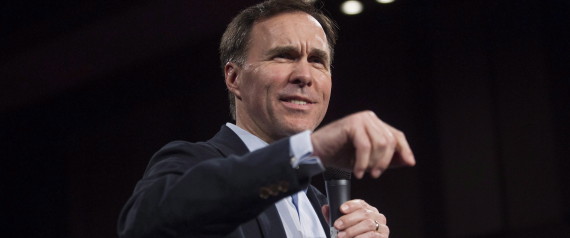Closing five tax loopholes that mostly benefit the wealthy would raise nearly $16 billion annually for Canada’s federal and provincial governments, according to a study from a prominent economist.
Toby Sanger says these tax loopholes — which have grown more generous since the late 1990s — have increased inequality and led to greater financial instability.
The loopholes have “actually slowed down economic growth,” Sanger told HuffPost Canada, because rising inequality depresses consumer demand.
Sanger is an economist with the Canadian Union of Public Employees, and sits on the board of Canadians for Tax Fairness. He says the research is “especially pertinent ... given the new Liberal government’s commitment to review and eliminate regressive tax loopholes in their election platform.”
The federal Liberal government will release its first budget March 22. Finance Minister Bill Morneau predicted this week that Canada’s deficit for next fiscal year will be $18.4 billion. That’s five times as large as the previous estimate made just three months ago.
The largest tax loophole — costing the feds upwards of $12 billion a year — is the fact that capital gains (profits from investments) are only partially included in income taxes. This means investment gains are taxed at half the rate as wage income, Sanger says.
Sanger estimates 90 per cent of the benefits of this loophole accrue to the top 10 per cent of earners.
Using calculations from earlier research, the study found the use of tax havens costs Canada about $2 billion annually; stock option deductions cost some $800 million a year; and corporate meal and entertainment deductions cost $460 million.
Sanger’s study estimates misuse of the small-business tax credit costs the feds $500 million annually.
The small-business tax credit is “widely abused by higher income professionals including doctors, dentists and small business owners,” Sanger asserted. Individuals who incorporate themselves pay an 11-per-cent tax rate, compared to a personal income tax rate of up to 33 per cent.
While campaigning last fall, Prime Minister Justin Trudeau waded into controversy by making the same assertion. The Canadian Federation of Independent Business said it saw “no evidence” that individuals were incorporating themselves to save on taxes.
Sanger says capital gains tax reform should be the priority for the Liberals, and he wants to see investment profits taxed at the same rate as “income from working.” He suggests raising the tax rate on investments gradually, and paring back the tax rate on investments to account for inflation.
Here is Sanger's breakdown of what he calls the top five regressive tax loopholes in Canada.
Original Article
Source: huffingtonpost.ca/
Author: Daniel Tencer
Toby Sanger says these tax loopholes — which have grown more generous since the late 1990s — have increased inequality and led to greater financial instability.
The loopholes have “actually slowed down economic growth,” Sanger told HuffPost Canada, because rising inequality depresses consumer demand.
Sanger is an economist with the Canadian Union of Public Employees, and sits on the board of Canadians for Tax Fairness. He says the research is “especially pertinent ... given the new Liberal government’s commitment to review and eliminate regressive tax loopholes in their election platform.”
The federal Liberal government will release its first budget March 22. Finance Minister Bill Morneau predicted this week that Canada’s deficit for next fiscal year will be $18.4 billion. That’s five times as large as the previous estimate made just three months ago.
The largest tax loophole — costing the feds upwards of $12 billion a year — is the fact that capital gains (profits from investments) are only partially included in income taxes. This means investment gains are taxed at half the rate as wage income, Sanger says.
Sanger estimates 90 per cent of the benefits of this loophole accrue to the top 10 per cent of earners.
Using calculations from earlier research, the study found the use of tax havens costs Canada about $2 billion annually; stock option deductions cost some $800 million a year; and corporate meal and entertainment deductions cost $460 million.
Sanger’s study estimates misuse of the small-business tax credit costs the feds $500 million annually.
The small-business tax credit is “widely abused by higher income professionals including doctors, dentists and small business owners,” Sanger asserted. Individuals who incorporate themselves pay an 11-per-cent tax rate, compared to a personal income tax rate of up to 33 per cent.
While campaigning last fall, Prime Minister Justin Trudeau waded into controversy by making the same assertion. The Canadian Federation of Independent Business said it saw “no evidence” that individuals were incorporating themselves to save on taxes.
Sanger says capital gains tax reform should be the priority for the Liberals, and he wants to see investment profits taxed at the same rate as “income from working.” He suggests raising the tax rate on investments gradually, and paring back the tax rate on investments to account for inflation.
Here is Sanger's breakdown of what he calls the top five regressive tax loopholes in Canada.
Original Article
Source: huffingtonpost.ca/
Author: Daniel Tencer


No comments:
Post a Comment